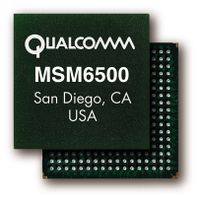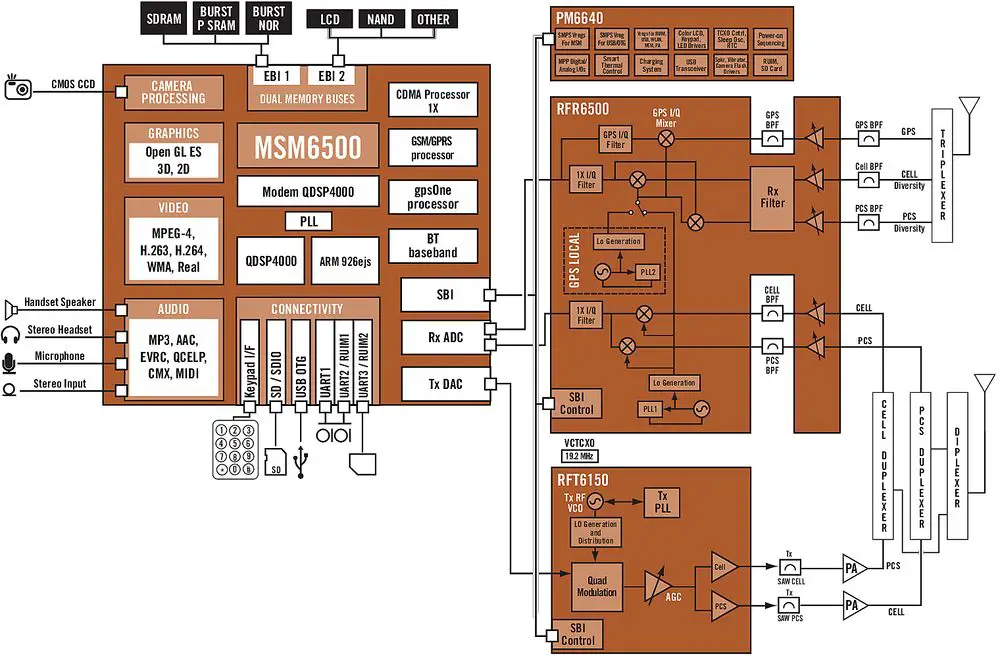From WikiChip
Difference between revisions of "qualcomm/msm6xxx/msm6500"
m (Bot: moving all {{mpu}} to {{chip}}) |
|||
| (11 intermediate revisions by 2 users not shown) | |||
| Line 1: | Line 1: | ||
{{qualcomm title|MSM6500}} | {{qualcomm title|MSM6500}} | ||
| − | {{ | + | {{chip |
| name = Qualcomm MSM6500 | | name = Qualcomm MSM6500 | ||
| − | | no image = | + | | no image = |
| − | | image = | + | | image = msm6500 hires.jpg |
| image size = | | image size = | ||
| caption = | | caption = | ||
| designer = Qualcomm | | designer = Qualcomm | ||
| + | | designer 2 = ARM Holdings | ||
| manufacturer = TSMC | | manufacturer = TSMC | ||
| manufacturer 2 = IBM | | manufacturer 2 = IBM | ||
| Line 83: | Line 84: | ||
}} | }} | ||
'''MSM6500''' is a {{arch|32}} [[ARM]] [[system-on-chip]] with [[3G]] wireless capabilities developed by [[Qualcomm]] and introduced in [[2003]] for the mobile market. This SoC was part of the {{qualcomm|MSM6xxx}} [[part of::Multimedia Platform]] offering support for more advanced features such as position-location services, video, audio, and gaming. | '''MSM6500''' is a {{arch|32}} [[ARM]] [[system-on-chip]] with [[3G]] wireless capabilities developed by [[Qualcomm]] and introduced in [[2003]] for the mobile market. This SoC was part of the {{qualcomm|MSM6xxx}} [[part of::Multimedia Platform]] offering support for more advanced features such as position-location services, video, audio, and gaming. | ||
| + | |||
| + | == Cache == | ||
| + | {{main|arm holdings/microarchitectures/ARM7#Memory_Hierarchy|l1=ARM9 § Cache}} | ||
| + | {{cache info | ||
| + | |l1i cache=16 KiB | ||
| + | |l1i break=1x16 KiB | ||
| + | |l1i desc=4-way set associative | ||
| + | |l1i extra= | ||
| + | |l1d cache=16 KiB | ||
| + | |l1d break=1x16 KiB | ||
| + | |l1d desc=4-way set associative | ||
| + | |l1d extra= | ||
| + | }} | ||
| + | |||
| + | == Wireless == | ||
| + | * Supported frequencies 450 MHz, 800 MHz, 1900 MHz, 2100 MHz (IMT), quad GSM | ||
| + | {{wireless links | ||
| + | | 2g = true | ||
| + | | gsm = true | ||
| + | | gprs = true | ||
| + | | edge = | ||
| + | | cdmaone = true | ||
| + | | is-95a = true | ||
| + | | is-95b = true | ||
| + | | 3g = true | ||
| + | | cdma2000 = true | ||
| + | | cdma2000 1x = true | ||
| + | | cdma2000 1xev-do = true | ||
| + | | cdma2000 1x adv = | ||
| + | | umts = | ||
| + | | wcdma = | ||
| + | | hsdpa = | ||
| + | | hsupa = | ||
| + | }} | ||
| + | |||
| + | == Digital Signal Processing == | ||
| + | * '''DSP:''' 2x [[dsp::QDSP4000]] [[dsp base frequency::73 MHz]] | ||
| + | |||
| + | == Expansions == | ||
| + | * '''LCD:''' 18-bit, QCIF | ||
| + | ** Up to 176 pixels x 220 pixels resolution | ||
| + | * '''USB:''' USB2.0 FS Peripheral | ||
| + | * '''Camera:''' up to 1.3 megapixel | ||
| + | * '''Bluetooth:''' BT 1.1 | ||
| + | * Video Codecs: MPEG-4, H.263 and RealNetworks | ||
| + | * Audio Codecs: QCELP, EVRC, AMR-NB, AAC, aacPlus and RealNetworks | ||
| + | * Hardware-based Image Signal Processor and JPEG encoder | ||
| + | * {{qualcomm|gpsOne}} position-location capabilities | ||
| + | * Removable User Identity Module (R-UIM) | ||
| + | * MIDI Synthesizer (72 polyphony) | ||
| + | * Support for digital stereo output up to 48 kHz | ||
| + | * MMC/SDIO removable storage support | ||
| + | |||
| + | == Utilizing devices == | ||
| + | <!-- * [[used by::XXXXXXXXXXXXXXXX]] --> | ||
| + | |||
| + | {{expand list}} | ||
| + | |||
| + | == Diagram == | ||
| + | [[File:diagram msm6500.jpg|1000px]] | ||
| + | |||
| + | == Documents == | ||
| + | === Datasheets === | ||
| + | * [[:File:diagram msm6500 cs.pdf|MSM6500 Diagram]] | ||
| + | * [[:File:msm6500 chipset.pdf|MSM6500 Chipset]] | ||
| + | |||
| + | === Other === | ||
| + | * [[:File:platform multimedia.pdf|Multimedia Platform Overview]] | ||
Latest revision as of 15:32, 13 December 2017
| Edit Values | |
| Qualcomm MSM6500 | |
 | |
| General Info | |
| Designer | Qualcomm, ARM Holdings |
| Manufacturer | TSMC, IBM |
| Model Number | MSM6500 |
| Market | Mobile, Embedded |
| Introduction | March 20, 2001 (announced) July 9, 2003 (launched) |
| General Specs | |
| Family | MSM6xxx |
| Series | MSM |
| Locked | Yes |
| Frequency | 146 MHz |
| Bus type | AMBA 2 |
| Microarchitecture | |
| Microarchitecture | ARM9 |
| Chipset | MSM6xxx |
| Core Name | ARM926EJ-S |
| Process | 90 nm |
| Technology | CMOS |
| Cores | 1 |
| Threads | 1 |
| Max Memory | 4 GiB |
| Max Address Mem | 0xFFFFFFFF |
| Multiprocessing | |
| Max SMP | 1-Way (Uniprocessor) |
MSM6500 is a 32-bit ARM system-on-chip with 3G wireless capabilities developed by Qualcomm and introduced in 2003 for the mobile market. This SoC was part of the MSM6xxx Multimedia Platform offering support for more advanced features such as position-location services, video, audio, and gaming.
Contents
Cache[edit]
- Main article: ARM9 § Cache
| Cache Info [Edit Values] | ||
| L1I$ | 16 KiB 16,384 B 0.0156 MiB |
1x16 KiB 4-way set associative |
| L1D$ | 16 KiB 16,384 B 0.0156 MiB |
1x16 KiB 4-way set associative |
Wireless[edit]
- Supported frequencies 450 MHz, 800 MHz, 1900 MHz, 2100 MHz (IMT), quad GSM
| Cellular | ||||||||||||||
| 2G |
| |||||||||||||
|---|---|---|---|---|---|---|---|---|---|---|---|---|---|---|
| 3G |
| |||||||||||||
Digital Signal Processing[edit]
- DSP: 2x QDSP4000 73 MHz0.073 GHz
73,000 kHz
Expansions[edit]
- LCD: 18-bit, QCIF
- Up to 176 pixels x 220 pixels resolution
- USB: USB2.0 FS Peripheral
- Camera: up to 1.3 megapixel
- Bluetooth: BT 1.1
- Video Codecs: MPEG-4, H.263 and RealNetworks
- Audio Codecs: QCELP, EVRC, AMR-NB, AAC, aacPlus and RealNetworks
- Hardware-based Image Signal Processor and JPEG encoder
- gpsOne position-location capabilities
- Removable User Identity Module (R-UIM)
- MIDI Synthesizer (72 polyphony)
- Support for digital stereo output up to 48 kHz
- MMC/SDIO removable storage support
Utilizing devices[edit]
This list is incomplete; you can help by expanding it.
Diagram[edit]
Documents[edit]
Datasheets[edit]
Other[edit]
Facts about "MSM6500 - Qualcomm"
| l1d$ description | 4-way set associative + |
| l1d$ size | 16 KiB (16,384 B, 0.0156 MiB) + |
| l1i$ description | 4-way set associative + |
| l1i$ size | 16 KiB (16,384 B, 0.0156 MiB) + |
| part of | Multimedia Platform + |
